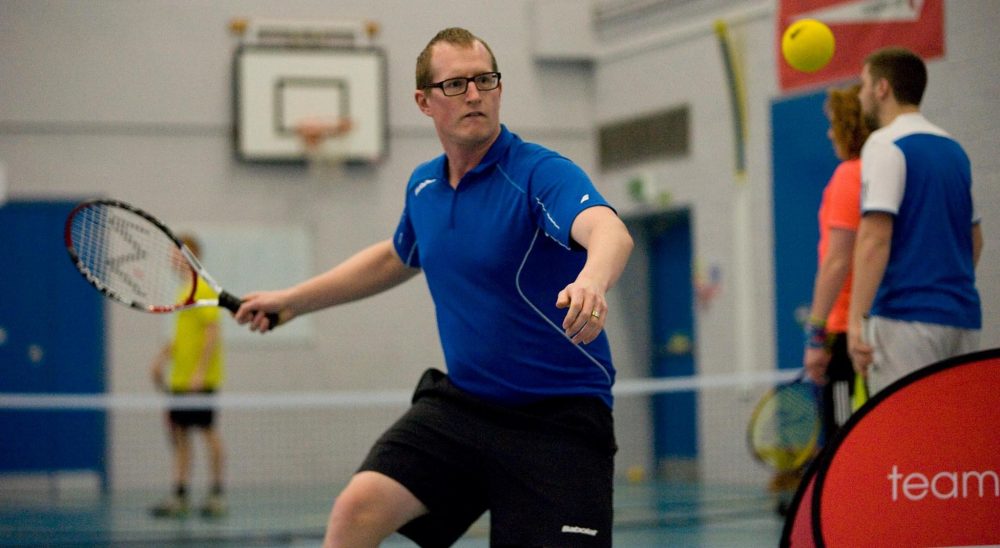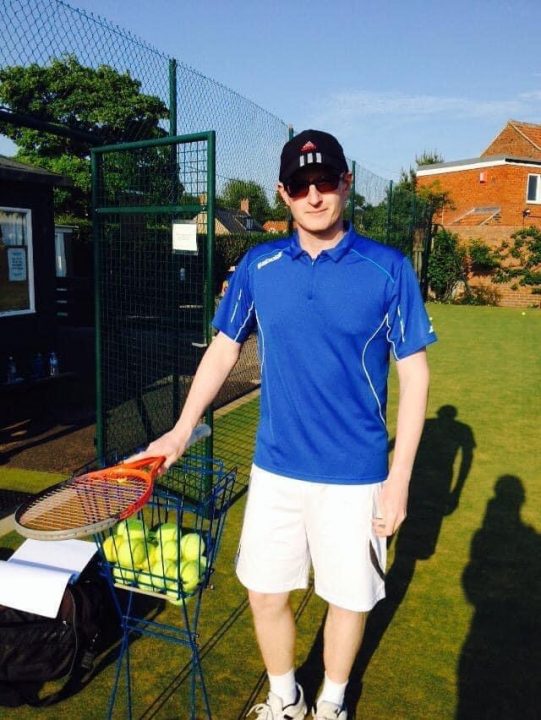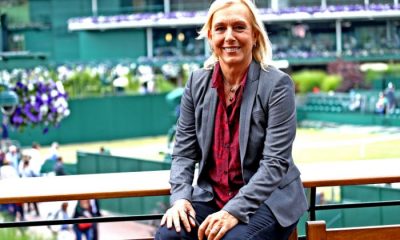When he was younger Ian Pearson-Brown didn’t want to be gay, he didn’t want anybody to know he was gay and he even attempted suicide as a result of suppressing his sexuality.
Like many in England, he grew up surrounded by sport and was obsessed with it. In school Physical Education was his favourite subject, he had an affection for playing racket sports and football with his friends. Growing up during the 1980s and 1990s there were few openly LGBT athletes, especially in male sports. During this time tennis had Billie Jean King and Martina Navratilova, who were both open about their sexuality.
However, this was no consultation for a boy like Pearson whose only idol was that of Justin Fashanu. The first back footballer to command a £1M transfer fee came out in 1990 but was subjected to harsh media scrutiny. During that period, there were also many misconceptions about AIDS and the LGBT community with one club requesting that Fashanu take an HIV test as part of his medical.
“When I was 13 and realized I was gay everything changed. PE became a lesson filled with anxiety. Male sport in that era was not the most welcoming of environments for anyone who was LGBTQ+ as Justin Fashanu would testify so I felt I had to choose between being into sport or being gay,” Pearson tells UbiTennis.
So which path did he initially choose? Sport was the route he went down and he has managed to form a successful tennis career. He has worked as a coach for more than 20 years and has been recognized for his work. In 2021 the former Newcastle University graduate was named Durham and Cleveland Tennis Development Coach of the Year.
Getting to the position Pearson is now has been hard work, both physically and mentally. Embarking upon working in tennis he concealed his sexuality for a long time in fear of the possible repercussions he may face from both his colleagues and those who he was coaching if he came out. Keeping a huge part of his life secret and the fear of being outed by others took its toll on him.
“I chose to deny my sexuality and live a lie until I was nearly 30,” he explains. “In that time I became a full-time tennis coach working in the North East. My own internal barriers and prejudices combined with a lack of role models in men’s sport led me to believe I couldn’t exist as my authentic self in Tennis.’
“I went through years of depression and anxiety. I attempted to take my own life. I was constantly worried if I was outed that parents wouldn’t bring their kids back to my sessions and my tennis mates would stop speaking to me.”
Pride in Tennis
At the age of 30, Pearson decided enough was enough and started working in tennis as an out gay man. He was encouraged to do so by his partner who is now his husband. The reception he received exceeded expectations and also for him sparked a revelation.
“I began to realise that Tennis does not have to be an intimidating environment for LGBTQ+ people if the subject is talked about openly. So I have spent the last 10 years putting time aside to try and change the culture in our sport.”
Pearson is the founder of Pride in Tennis. A network supporting all British-based LGBTQI+ tennis players, coaches, officials and fans which have been endorsed by the LTA. The initiative came about following an open letter issued by CEO Scott Lloyd asking how tennis can be more diverse. Spotting an opportunity he and a group of volunteers from around the UK has paired up with LTA to create Pride in Tennis which aims to promote, support and educate those about tennis opportunities for the LGBT community.
“Our vision is to make tennis in Britain an environment which is safe and inclusive for all LGBT+ players, coaches, officials and fans to be able to exist as their authentic selves with confidence and without prejudice.”
In February there will be an official launch for the network at the Roehampton Tennis Centre. The training base for many British players during the offseason and throughout the year. Covid-permitting, the event is set to feature keynote speakers, breakout feedback sessions, on-court tennis coaching and even a tennis competition.
Getting to this stage hasn’t been easy. It was less than two years ago Pearson spoke about his frustration of trying to generate enough interest from tennis officials concerning the LGBT community. In June 2020 he told Pride Of The Terraces ‘Whenever I suggest things that other sports are doing to promote visibility and inclusion, I get told ‘we don’t need to do that’, or ‘you don’t want to do that because it’s divisive.’
So what has changed since then?
“In a short space of time the governing body’s perspective has gone from ‘not recognizing the problem’ to wanting to actively challenge the barriers, stigmas and stereotypes that prevent LGBTQ+ people from playing sport,” he explains. “In terms of the general tennis playing population in the clubs and parks around the UK the culture will take time to change but we have plans to put resources and tools in place to help. We have already delivered training accessible to all LTA licensed coaches.”
Working with Newcastle United
Tennis isn’t the only sport where Pearson is fighting to break down the barriers. He is the co-chair of United with Pride, a Newcastle United LGBT+ supporters group that has an official partnership with the Premier League Club. He is also an ambassador for Newcastle’s United As One which encapsulates the club’s work in the fields of diversity, inclusion and welfare.
“In football where there is a more immediate need to tackle homophobic attitudes and behaviours. I have had to learn a great deal of patience when trying to change cultures entrenched in historic misogyny, racism and intolerance,” he explains when comparing tennis to football.
“I have had to learn to have a thick skin when faced with regular online targeted abuse. I have learned that you can’t just preach to the already converted allies but also to those who you may not see eye to eye with and engage with them in the hope of changing their views.”
Pearson has previously spoken on the BBC’s LGBT Sport Podcast about his work and to various other media outlets. Even more so in recent months following the takeover of Newcastle United by a group led by Saudi Arabia’s sovereign wealth fund. In Saudi Arabia there are no laws regarding sexual orientation and LGBT people can be imprisoned.
Now the goal is to incorporate what he has learned from the world of football into the newly formed Pride in Tennis. Recently the ATP conducted a survey on the men’s Tour concerning attitudes towards the LGBT community. The governing body contacted Lou Englefield, who is the director of Pride Sports, a UK organisation that focuses on LGBTQ+phobia in sport and aims to improve access to sport for all LGBTQ+ people. Through their connection, they linked up with Eric Denison, a behavioural science researcher at Monash University’s School of Social Sciences.
“I was delighted to see that at both the Australian and US open’s there has been some dialogue and visibility work conducted by the ATP and WTA,” Pearson commented on the effort being made by tennis’ governing bodies.
“I would say they have come a long way since their official Twitter account unwittingly shared a TikTok containing homophobic slurs and stereotypes. Then taking a full 24hrs to release an apology.’
“However, it is a small step on a long journey to get to the point where the tour is safe for an LGBTQ+ male player, particularly with so many events being held in countries where it is illegal or socially unacceptable to be gay.”
Focus on the foundation of tennis
Pearson’s own personal difficulty in coming out as gay whilst working in sport is not an isolated incident, even though times are changing for the good. The Trevor Project is a nonprofit organisation focus on suicide prevention among LGBT youth in America. Their National Survey on LGBTQ Youth Mental Health in 2021 found that more than two thirds (68%) of respondents didn’t play sport for a school or community league or club. Among the 34,000 respondents a number said one of the reasons why they don’t want to play sports is linked to ‘discrimination or fear of LGBTQ-based discrimination.’
On the other hand, a study called Out In Sports extensively looked into the levels of acceptance athletes in the North American sports system receive when they came out to their peers. The comprehensive study was conducted by leading LGBT sports website Outsports, the University of Winchester and the Sports Equality Foundation. The study analysed responses of 370 athletes who were out to high school teammates, and 630 athletes out to college teammates from America and Canada. More than 95% said their teammates’ responses to them coming out were overall “neutral” to “perfect.” In tennis specifically, 89% said they received a positive response when they came out with the other 11% saying they received a ‘neutral’ response.
“My barriers were internal and went unchallenged by role models such as family members, teachers and coaches. Changes in relationships education and a zero-tolerance approach to homophobic, biphobic and transphobic behaviour in the PE environment will go a long way to help with this,” Pearson commented.
“In the absence of professional role models, (the women’s game may have some LGBTQ+ pioneers but they are still an underrepresented minority), we have to create allies at a grassroots level. Coaches wearing rainbow laces, and venues celebrating pride month.”
It is hoped that Pride in Tennis will be the frontrunner in driving this change in the UK. Their launch at the National Tennis Centre in Roehampton is set to take place on February 13th.



 Hot Topics3 days ago
Hot Topics3 days ago
 Latest news3 days ago
Latest news3 days ago
 Hot Topics2 days ago
Hot Topics2 days ago
 Hot Topics3 days ago
Hot Topics3 days ago
 Focus2 days ago
Focus2 days ago
 Focus2 days ago
Focus2 days ago
 Focus2 days ago
Focus2 days ago
 Hot Topics2 days ago
Hot Topics2 days ago




























